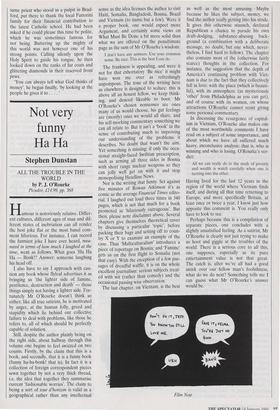Not very funny Ha Ha
Stephen Dunstan
ALL THE TROUBLE IN THE WORLD by P. J. O'Rourke Picador, £14.99, pp. 368 Humour is notoriously relative. Differ- ent cultures, different ages of man and dif- ferent states of inebriation can all render the best joke flat or the most banal com- ment hilarious. For instance, I can record the funniest joke I have ever heard, mea- sured in terms of how much I laughed at the time, went as follows. What goes 'Ha Ha Ha — Bonk!? Answer: someone laughing his head off.
I also have to say I approach with cau- tion any book whose flyleaf advertises it as bringing us 'the lighter side of famine, pestilence, destruction and death' — those things simply not having a lighter side. For- tunately Mr O'Rourke doesn't think so either; like all true satirists, he is motivated by anger, at the human folly, greed and stupidity which lie behind our collective failure to deal with problems, like those he refers to, all of which should be perfectly capable of solution.
Still, despite the author plainly being on the right side, about halfway through this volume one begins to feel swizzed on two counts. Firstly, by the claim that this is a book, and secondly, that it is a funny book (funny ha-ha-bonk! that is). In fact it is a collection of foreign correspondent pieces sewn together by not a very thick thread, i.e. the idea that together they summarise current 'fashionable worries'. The claim to being a sort of tour d'horizon is valid in a geographical rather than any intellectual
sense as the idea licenses the author to visit Haiti, Somalia, Bangladesh, Bosnia, Brazil and Vietnam (to name but a few). Were it a proper book, one would expect more Argument, and certainly some views on What Must Be Done a bit more solid than what we are offered on the penultimate page as the sum of Mr O'Rourke's wisdom:
I don't have any answers. Use your common sense. Be nice. This is the best I can do.
The frankness is appealing, and were it not for that exhortatory 'Be nice' it might have won me over as refreshingly unpompous. The tone of the writing here as elsewhere is designed to seduce: this is above all an honest fellow, we keep think- ing, and deuced likeable to boot. Mr O'Rourke's chosen nonsenses are ones many of us would choose, his gut feelings are (mostly) ones we would all share, and his self-mocking commentary something we can all relate to. But it isn't a 'book' in the sense of contributing much to improving our understanding of the problems it describes. No doubt that wasn't the aim. Yet something is missing: if only the occa- sional straight-faced Swiftian prescription, such as arming all three sides in Bosnia with short range nuclear weapons so they can jolly well get on with it and stop monopolising Headline News.
Nor is the writing that funny. Set against five minutes of Rowan Atkinson it's as comic as the average Financial Times edito- rial. I laughed out loud three times in 340 pages, which is not that much for a book promoted as 'hilariously outrageous'. But then, please note disclaimer above. Several chapters give themselves theoretical cover by discussing a particular 'topic', before packing their bags and setting off to coun- try X or Y to examine an example of the case. Thus 'Multiculturalism' introduces a piece of reportage on Bosnia; and 'Famine' gets us on the first flight to Somalia (not that easy). With the exception of a few pas- sages of dreadful waffle, it is on the whole excellent journalism: serious subjects treat- ed with wit (rather than comedy) and the occasional passing wise observation.
The last chapter, on Vietnam, is the best
as well as the most amusing. Maybe because he likes the subject, money, we find the author really getting into his stride. It gives this otherwise staunch, declared Republican a chance to parade his own draft-dodging, substance-abusing back- ground (a combination with a deliberate message, no doubt, but one which, never- theless, I find hard to follow). The chapter also contains most of the (otherwise fairly scarce) thoughts in the collection. For instance, the suggestion that the depth of America's continuing problem with Viet- nam is due to the fact that they collectively fell in love: with the place (which is beauti- ful), with its atmosphere (as mysteriously `other' from Philadelphia as you can get), and of course with its women, on whose attractions O'Rourke cannot resist giving some personal commentary.
In discussing the resurgence of capital- ism in Vietnam, O'Rourke also makes one of the most worthwhile comments I have read on a subject of some importance, and about which we have all suffered much heavy, inconclusive analysis: that is, who is winning and who is losing. O'Rourke's ver- dict:
All we can really do in the study of poverty and wealth is watch carefully when one is turning into the other.
Having lived for the last 12 years in the region of the world where Vietnam finds itself, and during all that time returning to Europe, and more specifically Britain, at least once or twice a year, I know just how apposite this comment is. You really only have to look to see.
Perhaps because this is a compilation of separate pieces, one concludes with a slightly unsatisfied feeling. As a satirist, Mr O'Rourke is clearly not just trying to make us hoot and giggle at the troubles of the world. There is a serious core to all this, one supposes, especially as its pure entertainment value is not that great. The catch is, after we've all had a good smirk over our fellow man's foolishness, what do we do next? Something tells me I can guess what Mr O'Rourke's answer would be.
Film Noir









































 Previous page
Previous page